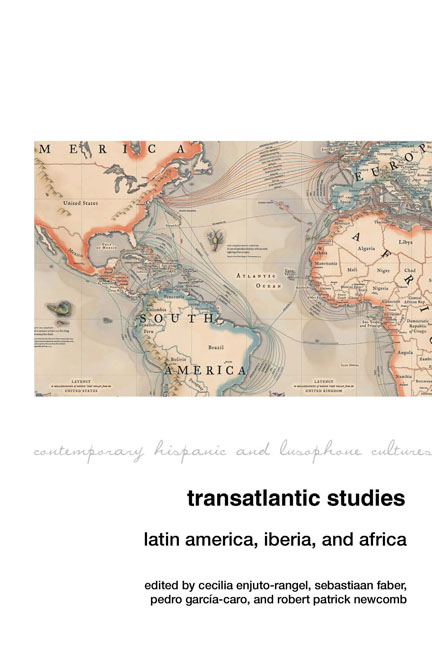Book contents
- Frontmatter
- Contents
- Introduction: Transatlantic Studies: Staking Out the Field
- Transatlantic Methodologies
- Transatlantic Linguistic Debates
- Transatlantic Displacement
- Transatlantic Memory
- Transatlantic Postcolonial Affinities
- Transatlantic Influence
- Epilogue: The Futureâif There Is OneâIs Transatlantic
- Index
35 - Marcelino Menéndez Pelayo: The Colonial Matrix and the Latin American Literatures
- Frontmatter
- Contents
- Introduction: Transatlantic Studies: Staking Out the Field
- Transatlantic Methodologies
- Transatlantic Linguistic Debates
- Transatlantic Displacement
- Transatlantic Memory
- Transatlantic Postcolonial Affinities
- Transatlantic Influence
- Epilogue: The Futureâif There Is OneâIs Transatlantic
- Index
Summary
The Antología de poetas hispano-americanos that Marcelino Menendez Pelayo was commissioned to write by the Real Academia de la Lengua Espanola appeared between 1893 and 1895, a time of fledgling academic institutions in the new American countries. In the introductions to the four volumes of this poetry selection, Menendez Pelayo not only describes the Latin American literatures as an extension of the literary production of Spain; his main task was the proposal of a narrative that was primarily intended to recover the literary production of the colonial period. This recovery was not limited to archival research, but also included the symbolic redistribution of Spanish cultural capital, assigning texts to the new Latin American literatures that had previously been exclusive parts of the Spanish literature. In this way the Antología proposed colonial literary production as an umbilical cord that connected the Spanish empire and its former colonies (Degiovanni 2007: 58). My study examines two potential paradoxes of the relationship between Spain and Hispanic America present in Menendez Pelayo's project. The first involves Spanish literature itself: how the redefinition of Spanish literature as an imperial and self-sufficient corpus of texts, proposed by Menendez Pelayo, demonstrates the need—or “imperial insufficiency”—of literary texts from the former colonies as evidence of such imperial status. The second analyzes the first history of Peruvian literature, Jose de la Riva-Aguero y Osma's Carácter de la literatura del Perú Independiente (1905), as an example of the literary historiography produced in Latin America at that time, and tries to understand what made it possible for an effort like that of Menendez Pelayo, ideologically conservative and neocolonial, to be part of the content of Riva-Agüero's work.
Empire and the Colonial Matrix
In the “Advertencias generales” [Note to the Reader] of his Antología, Menendez Pelayo argues that all classical languages are imperial, a point that the texts included in the body of the Antología will go on to prove.
- Type
- Chapter
- Information
- Transatlantic StudiesLatin America, Iberia, and Africa, pp. 432 - 442Publisher: Liverpool University PressPrint publication year: 2019



